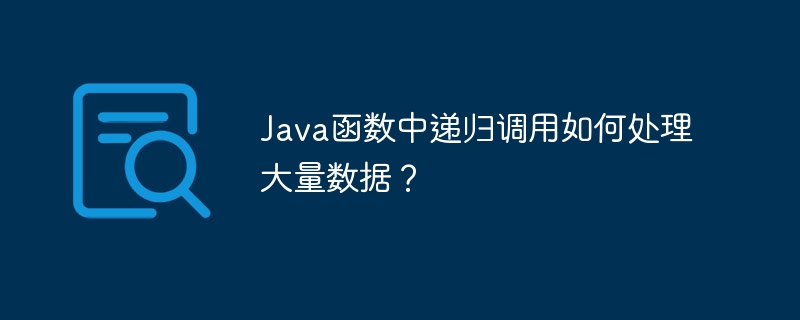
Methods for recursively processing large amounts of data include: using loops instead of recursions to avoid stack overflow. Use the divide-and-conquer method to break large problems into smaller sub-problems. Use the Java virtual machine's optimization of tail recursion to avoid stack overflow.

How to handle large amounts of data with recursive calls in Java functions
Overview
When When a recursive function processes a large amount of data, it can cause a stack overflow because each recursive call adds new state to the call stack. To avoid this, different methods can be used to handle large amounts of data while maintaining the advantages of recursive calls.
Use loops instead of recursion
One way is to convert the recursive function into an iterative function, using loops instead of recursive calls to process the data. This can significantly reduce the memory required for function call stacks, thereby improving application performance.
public static int factorial(int n) {
int result = 1;
for (int i = 1; i <= n; i++) {
result *= i;
}
return result;
}Use the divide-and-conquer method
Another approach is to use the divide-and-conquer method, which breaks a large problem into smaller sub-problems. By repeatedly breaking the problem into smaller chunks, you can reduce the amount of data processed with each recursive call.
public static int mergeSort(int[] arr, int start, int end){
if (start < end) {
int mid = start + (end - start) / 2;
mergeSort(arr, start, mid);
mergeSort(arr, mid + 1, end);
merge(arr, start, mid, end);
}
return arr;
}
public static void merge(int[] arr, int start, int mid, int end) {
int[] temp = new int[end - start + 1];
int left = start;
int right = mid + 1;
int k = 0;
while (left <= mid && right <= end) {
if (arr[left] < arr[right]) {
temp[k] = arr[left];
left++;
}
else {
temp[k] = arr[right];
right++;
}
k++;
}
} Tail recursion optimization
The Java Virtual Machine (JVM) is optimized for tail recursive calls. Therefore, if a recursive function is tail-recursive, the JVM can optimize it to avoid stack overflow.
public static int factorial(int n) {
return factorialHelper(n, 1);
}
private static int factorialHelper(int n, int acc) {
if (n == 0) {
return acc;
}
return factorialHelper(n - 1, acc * n);
}Practical case
Consider a function that calculates the nth number in the Fibonacci sequence. The function is defined as follows using the recursive method:
public static int fibonacci(int n) {
if (n == 0) {
return 0;
}
if (n == 1) {
return 1;
}
return fibonacci(n - 1) + fibonacci(n - 2);
}Using the loop instead of the recursive method, the Fibonacci function can be converted into the following iterative function:
public static int fibonacci(int n) {
if (n == 0) {
return 0;
}
if (n == 1) {
return 1;
}
int prev = 0;
int curr = 1;
for (int i = 2; i <= n; i++) {
int next = prev + curr;
prev = curr;
curr = next;
}
return curr;
}This An iterative method to efficiently calculate large numbers in the Fibonacci sequence without stack overflow errors.
The above is the detailed content of How to handle large amounts of data with recursive calls in Java functions?. For more information, please follow other related articles on the PHP Chinese website!




